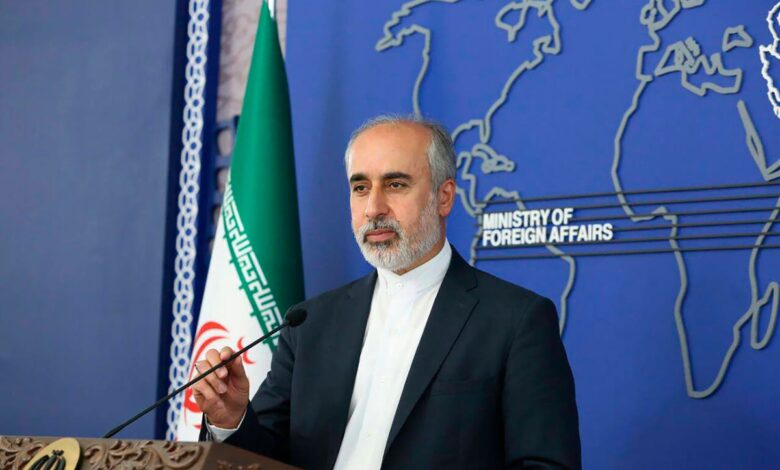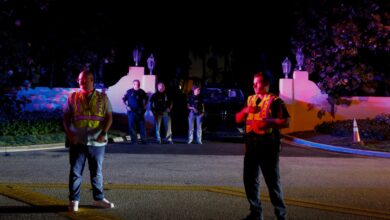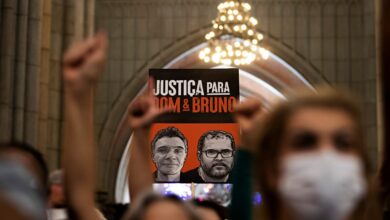Iran squirms over Rushdie attack, praising perpetrator while denying blame

Iran rejected accusations of culpability for the violent attack on author Salman Rushdie last week, denying direct involvement even as it blamed the 75-year-old and his supporters for the bloody incident.
In Tehran’s first official reaction to the 12 August knife attack, Iranian foreign ministry spokesman rejected accusations that Iran inspired the stabbing on the writer even while Iranian media gloated over his injuries and praised his attacker.
Iran’s Ayatollah Ruhollah Khomeini, leader of the 1979 revolution which transformed the country into an Islamic theocracy, had issued a 1989 “fatwa” or binding religious edict calling for Mr Rushdie’s death for writing his novel The Satanic Verses in 1988.
“The only thing I can say is that in the story of the attack on Salman Rushdie, I do not see anyone else to blame or even condemn other than his supporters,” Iranian Foreign Ministry spokesman Nasser Kanani said during his weekly press briefing, according to the official Islamic Republic News Agency (IRNA) quoted him as saying. “Nobody has a right to accuse the Islamic Republic of Iran.”
Mr Rushdie was stabbed by an alleged fan of the Islamic Republic during a literary event in upstate New York. He was taken off a ventilator and recovering from what appeared to be life-changing injuries.
The alleged assailant, 24-year-old Hadi Matar, is in custody. The New Jersey man of Lebanese Shiite descent allegedly ran up to Mr Rushdie and stabbed him nearly a dozen times in the abdomen, neck and face in front of hundreds of shocked onlookers.
The attack highlighted Iran’s history of extremism at a particularly sensitive moment when Tehran and world powers are attempting to restore a nuclear deal which would remove sanctions on the country.
Iran appeared to want it both ways, denying any responsibility for the attack while at the same time celebrating it. While Iranian officials have been restrained, Iranian media outlets tightly controlled by the regime lavished praise on the attacker, and declared that Mr Rushdie got what he deserved.
As Mr Rushdie clung to life over the weekend, one government newspaper referred to the attack as the “devil’s neck under the sword” while another said that the assailant’s “hand should be showered with kisses”.
Iran’s Press TV aired an Iranian commentator describing Mr Rushdie as “a Western tool to vilify Islam”.
Mohammad Marandi, an American-born Iranian operative close to the supreme leader, described Mr Rushdie as a writer who “spouts endless contempt for Islam and Muslims” in a tweet and suggested that the attack was a false-flag meant to derail the nuclear talks.
“I won’t be shedding tears,” he wrote.
The outpouring of hatred toward Mr Rushdie, prompted US secretary of state Antony Blinken’s condemnation.
“Iranian state institutions have incited violence against Rushdie for generations, and state-affiliated media recently gloated about the attempt on his life,” he said in a press release. “This is despicable.”
Mr Rushdie has been a target of Iranian leaders and religious institutions for years, and there remains a £3m bounty on his head, forcing the British-American author into hiding for a decade.
Under the reformist government of President Mohammad Khatami, Iran in 1998 announced it would not carry out the edict or encourage others to do so. But over the decades the fatwa against Mr Rushdie has become one of the foundational myths of the Islamic Republic
Mr Khomeini’s successor as supreme leader, Ayatollah Ali Khamenei, upheld the fatwa in 2017, and sent a tweet supporting it in 2019.
Mr Kanani on Monday said Mr Rushdie himself was responsible for the attack for insulting the sensibilities of 1.5 billion Muslims with his writing.
“The validation of the fatwa by Khomeini and some charities that are regime linked, shows that Iran’s responsibility doesn’t go back to 1989 but is quite current,” said Ali Fathollah-Nejad, an expert on Iran at the American Council on Germany (ACG). “It is clear at the very least that the attack was inspired by the Islamic Republic.”





